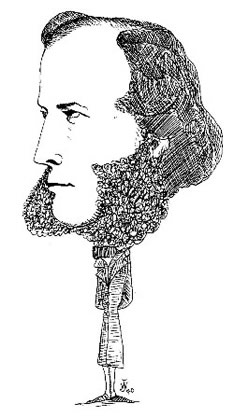
"Benzene"
September 20, 2006
Friedrich August Kekulé (1829-1896). German chemist. Initially a student of architecture, Kekulé studied chemistry under Liebig at Giessen and under Dumas in Paris. After brief periods in Switzerland and England (1854), and at the University of Heidelberg (1856), he became Professor of Chemistry at the universities of Ghent (1859) and Bonn (1867-1896). Acknowledged as one of the founders of classical molecular structure theory, Kekulé is best known for his proposal (along with the Scottish chemist, Archibald Scott Couper) that tetravalent carbon can undergo self-linkage to form homocatenated chains and rings (1858), and for his hexagonal cyclic structure for the benzene molecule (1865).
Courtesy of Professor William Jensen, Oesper Chair of the History of Chemistry and Chemical Education, University of Cincinnati
> Past Notable Chemists